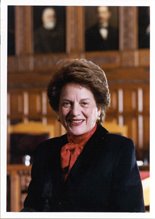
Mrs. NYPILB with her knight in shining armor.
Mrs. NYPILB sat jury duty last week She joins us today with a guest blog on her experience, with my occasional comments. That’s her pictured at right with her knight in shining armor.
——————————————————
Last week was civic duty week. On Tuesday, November 4th, along with a record number of Americans, I cast my vote for a new President. On Wednesday, along with a few hundred of my fellow county citizens, I showed up for jury duty in White Plains, NY.
Eric — the guy who normally writes this blog — made fun of me as a I walked out the door at 8:00 am to arrive at 8:30 am in White Plains, as the summons proposed. He assured me that I would be the first juror there. [As my brother-in-law Dan was when he sat.] I chose to ignore him being that I’m always early in whatever we do and, well, he’s always late. To my punctual dismay, I walked into a full room of prospective jurors listening attentively to a woman giving instructions about the jury selection process. I secretly couldn’t wait to go home and tell Eric, “I was right and YOU were wrong!”
An elderly judge came in to tell us more about the process and the cases. He was quite genial and cracked some jokes — most likely the same ones he uses 365 days a year. Then he told us of two interesting cases on the roster; one case was criminal in nature and could take up to three weeks and the other was a Med Mal case that could take four. You could feel the tension in the room as we all made silent prayers not to be picked for one of those. When the judge stated that anyone with vacation plans could be excused into the other room, I seriously contemplated lying. But, being the complete dork that I am, I became convinced that they would ask me for proof and then I’d be screwed into serving some Grand Jury case that would take months. So, I sat still, squirming in my seat.
My get-out-of-a-long-trial for free card came when the judge also excused anyone with children 12 and under.
Within 30-minutes, I was called into a separate room to undergo the voir dire process on what was described as a short civil case. I wasn’t picked with the first round of jurors to be questioned but was asked to stay in the room. I listened to the Plaintiff’s attorney methodically question each of the 12 potentials, at first with interest and then with cynicism, annoyance and finally complete and utter boredom.
[ET note — Keeping it interesting after the first few is always a challenge. When I sense the boredom come on, I’ll ask the next juror, “You’ve heard all the prior questions, what do you think I should know that is interesting?” When the jurors question themselves, the answers can be interesting.]
The case was simple. The Plaintiff was Verizon. The defendants were two contractors. One a GC and the other a sub-contractor who specialized in boring holes under the ground for excavation work. In a nutshell, while boring, the defendant(s) clipped a Verizon cable. Verizon said the contractors were negligent. The contractors claimed that Verizon was negligent due to the improper demarcation of where the wires in fact lied underground. It was the jurors’ duty to assign blame.
Out of the first group of potential jurors questioned, the lawyers nixed a handful, which meant that more of us had to undergo a round of mundane questioning, including me. The lawyer handling Verizon’s end of the argument was painful to listen to. I’m convinced it was his first case. He asked the same series of “yes” or “no” questions to each and every juror. When it came to my turn I had to bite my tongue not to say “Let me save you some time here. Yes, I have Verizon services. Yes, I’ve had problems with it. No I don’t think my past problems with Verizon will prejudice my judgment in this case. Yes, my husband is a Med Mal/PI attorney but I don’t think it’s relevant in this case. Yes, I have little kids but my Med Mal husband has agreed to be home to get the kids off the bus this week so I can serve. So, take me, I’m yours.”
[ET note: Yes and no questions in voir dire, are, of course, some of the worst. You learn virtually nothing about the potential juror. In such a situation, the question I would start with is, How do you feel about Verizon? And with yes or not questions, the lawyers can never conduct the Turkewitz Beer Test.]
Of course I didn’t do that. While questioning me, the Verizon man seemed to want to find an excuse for me to not sit on his jury. After saying to me “well, won’t your kids be upset if you don’t put them on the bus,” I looked him in the face and said, “they’ll live for 2 days. This is a good time for me to do my civic duty and I’d be happy to serve.”
I got picked. It was going to be a breeze. One to two days at the most.
Right before entering the courtroom, I found out I was an alternate. After taking the first seat in the front row, the Judge started reading us procedural directions. When I say “reading,” I mean reading. All I could think of was Snoopy and the “Wa, wa, wa, wa, wa, wa” one would hear when an adult talked to Linus, Charlie Brown or any of the other Peanuts characters. In his closing directives, the Judge did the same. What’s the point in reading us the directives if we can’t understand what the heck is being said? My guess is that it’s just to avoid any appeals based on improperly directing the jury.
I can’t remember a single other situation in my life where I have been forced to be “taught” something and not allowed to interrupt with any questions. This was the hardest part of sitting on a jury. Every 10 minutes, I wanted to be like Horshack in Welcome Back Kotter — “ooh, ooh, ooh” with my hand waving high in the air! Instead, I had to listen and decide who was liable without having all the information I needed. Hmm…maybe I shouldn’t have cancelled those LSATs after graduating from Michigan.
[ET note: Some judges have experimented with having jurors ask questions, via a written submission to the judge.]
The funniest part of the day had to do with an incident regarding the court reporter. As he was typing away, every word uttered in the courtroom was magically transcribed onto a computer screen. This screen happened to be facing the juror box. There was one 30-second period where there was a pause in the dialogue and we all saw the Reporter check his email on AOL! Granted, it was the fastest email check I’ve ever seen in my life. Was he looking to see if his horse won the race? If his stocks were down? If he was gonna get laid later?
In the end, the trial was over in just a few short hours. I found the whole thing to be fascinating and was completely and utterly bummed that I was told to exit the courtroom and leave the building because, as an alternate, I was not needed anymore. I was not invited to deliberate. I had so much to say and nobody to say it to. I left with my tail between my legs. But once outside my tail started to wag when I realized that I wouldn’t be called to do this civic duty again for six long years. Phew.


